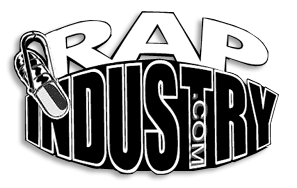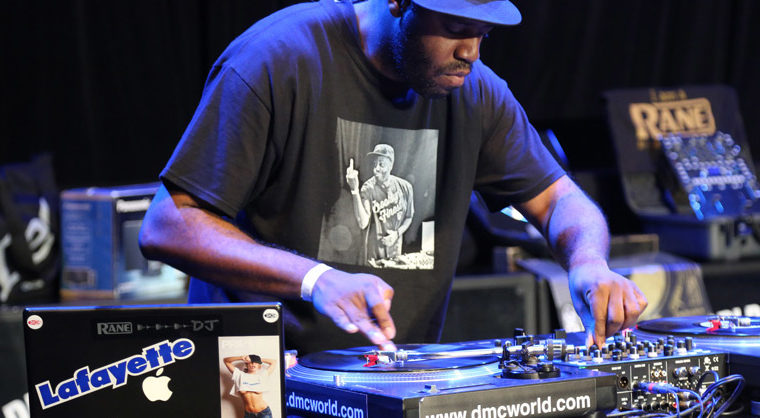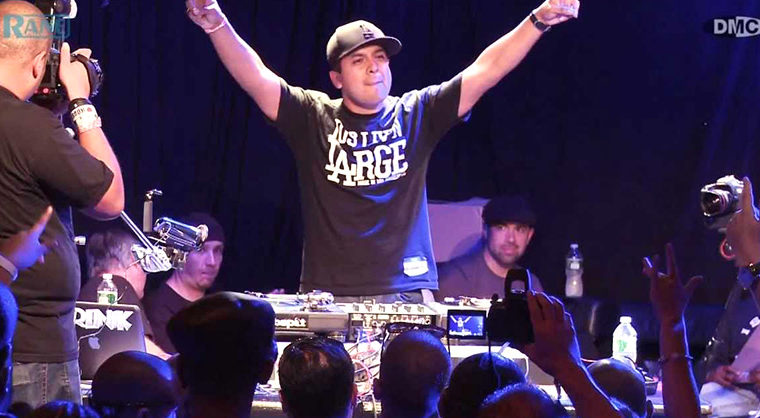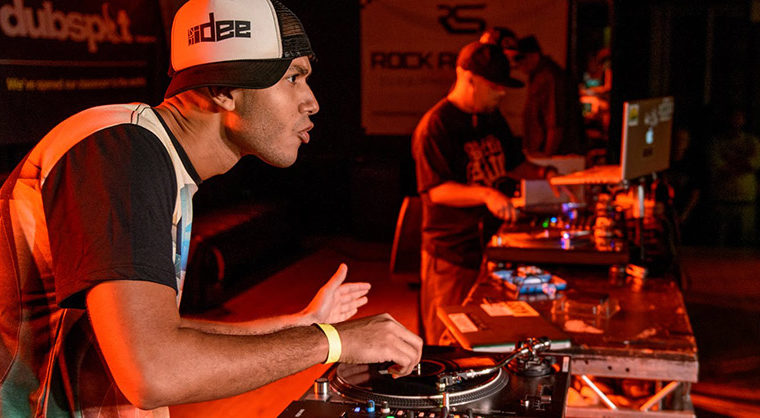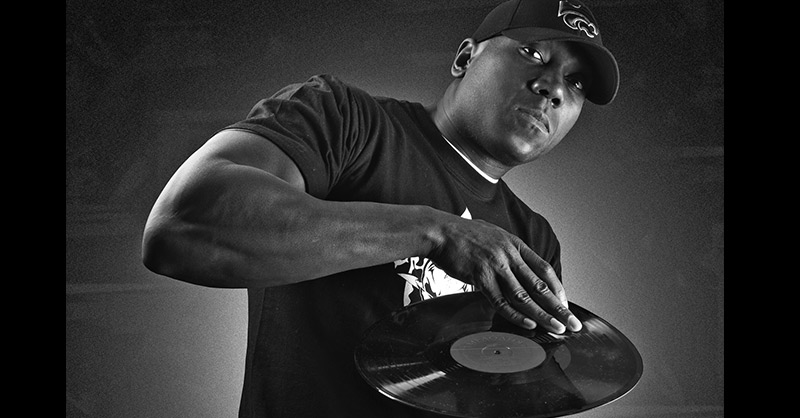
This is the spot where you’ll see upcoming DJ’s as well as established veterans in the game. This will be the section where we feature the hottest DJ’s on the scene.
“The buzz started to grow about a battle between the X-Men and ISP. I can remember the build up for months- even though it wasn’t a battle with actual judges, could anything have been crazier then a competition between the worlds best beat jugglers and the worlds best scratchers? It was like one of those crazy hypothetical sports questions people ask, like who’d win one on one, Magic or Bird, except it was real”….Rob Swift
What’s your first memory of Rob Swift? Mine is probably different from yours- I met Dr. Butcher, a guy you could say is Rob’s mentor, at the local barber shop. It was actually pretty famous back in the day- it was the spot where Anthony Mason (Ex Knick) used to get all those crazy designs in his hair done. Anyway- I met Butcher at this barbershop, I was about 14 or 15, didn’t know much about anything, but I knew of the X-Men. Butcher and I stayed in touch, but he wasn’t into DJing that much anymore, so he told me to call Rob Swift. Now if I was only slightly familiar with Butcher, mostly recognizing him from work with Kool G Rap, Rob Swift was significantly more recognizable to me. In fact, when Butch gave me Rob’s #, assuring me it’d be cool if I called, the first thing that came to my mind was the hypnotic rhythm of his famous juggle, one you should all be familiar with, “nobody beats the biz”. I started singing it to myself- “to get to get to get funky, to get to get to get dowwwwwn”. It was funny cuz as I was calling him; I didn’t expect much of a response. Instead, what I found was one of the coolest, easiest to talk to dudes, who in a lot of ways became a mentor to me. Now, 10 years later, Rob is asking me to run down his life in an easily digestible form. It was either roll with the usual PR written bullshit, or let you guys know the real. So here I am- a fan like the rest of you, to give you an inside perspective on Rob.
Born and raised in Jackson Heights, Queens, Swift (born Robert Aguilar) initially got into DJing in a pretty unique way- his pops. “My dad was a salsa and meringue DJ. My brother learned how to scratch and do all the hip hop deejaying stuff on my dad’s equipment (without his permission) and I’d sit there and watch him. When I entered the sixth grade, I decided I wanted to learn.” So unlike some of us who got influenced through hip hop records, DMC and NMS tapes, or movies (Juice!), Swift educated himself with the classic turntable beats of the early ’80s New York playground pioneers while listening to funk and jazz at home. “My older brother exposed me to all that,” he says. “All the stuff I create as a DJ is rooted in the songs that I heard from Bob James, Herbie Hancock and James Brown to Quincy Jones and old DJs like Grandmaster Flash and Grandwizard Theodore. That’s where my roots are.” In 1990, Swift enrolled as a student at Baruch College in New York and in 1995, graduated with a degree in psychology. “While I was deejaying I pursued college. Speech class and English serve a purpose, you know?” I think that purpose also translates into his cerebral style of scratching, juggling and making music. I think if you take into account all those influences, the psychology schooling, growing up the son of a DJ, his musical influences- you begin to piece together a really good understanding of Rob Swift the DJ.
It was 1991 when his career as a DJ started down the path of local to legendary when he joined the upstart DJ crew, the X-Men. Depending on who you ask, the X-Men got together to break up the monotony in the battle scene. The Supermen pretty much ran the scene, and if you weren’t down, you weren’t winning. So the X-Men started up- and from the X-Men came the legacy of Beat Juggling (making beats on the turntables.) Credited with being the first person to beat juggle, Steve Dee, who ironically also always wore a superman t-shirt, set the tone for what the X became famous for. Roc Raida, Johnny Cash, Dr Butcher, Sean C, Diamond Jay, a whole new movement of cats were putting it down in new ways on the turntables. In 1992, Rob was named DMC East Coast turntable champion. In 1993, he began producing and remixing tracks for other artists: Cornershop, Lords of Acid and the Altered Beats album for Bill Laswell?s Axiom label were among his earliest tracks.
In the early 90’s, the biggest thing a hip-hop DJ like Rob could do would be to DJ for a hip hop artist. For Rob- that came in the form of Akinyele, Although I know some CRAZY Ak related stories that I can’t even put in here, I’m gonna defer to Rob’s words about this part of his career- “Akinyele was discovered by The Large Professor. Ak made his debut on “Live At the Barbecue” a song which NAS aka Nasty Nas back then, made his debut on too. Shortly after the 1’st Main Source album “Breaking Atoms” Ak landed a deal with Interscope records. He knew he wanted a DJ. Someone he can rely on being an integral part of his albums and shows the way JMJ was to RUNDMC. Ak and Sinista were together in the studio for a Kool G Rap session one day and Ak mentioned he was looking for a DJ and Sinista suggested he get me. After hearing about me he decided to check me out at the 1992 East Coast DMC competition which I happened to win. He approached me after the battle, we exchanged numbers and after our first conversation he told me he wanted me to DJ for him. Djing for Ak propelled me to the next level. I got experience in the recording studio as a DJ. And Large Professor became my mentor as a producer. Large produced Ak’s entire 1st album. I would attend every single session. Even sessions they didn’t need me in, I’d just sit there and study Large work the boards. After we released Ak’s 1st album “Vagina Diner” I got my 1st experienced touring across the country and began to learn that performing routines in front of Battle crowds was completely different in comparison to performing in front of fans of Hip Hop that never saw a DJ battle. Djing for Ak was a stage in my career that truly helped me grow and prepared me for the tours with the X, the label deals, etc.”
Time past and the X-Men grew as they put down members like Mista Sinista, a guy who used to sit around and practice with Rob. While the X-Men grew in popularity, becoming hugely influential and spreading beat juggling around the world; the opposite side of the country had a crew called ISP (Invisibl Skratch Piklz), with Q-Bert, Mixmaster Mike and Shortkut. They started to grow and spread their own scratch styles amongst the masses- creating almost a subculture of scratching heads Vs juggling heads. Shortkut was the first on the West Coast to embrace juggling, and in New York, it was almost a revolution when Rob did his first scratching routine with the “All That Scratching’s making me itch” routine. I honestly can’t really think of any other DJ at the time in the local scene doing scratch routines, and it really opened the eyes to a lot of East Coast DJ’s that, you don’t have to just do one thing, you can be a well rounded DJ. Even though technically, it wasn’t revolutionary, it was funky and soulful, and made a real statement, so its impact was.
Around the same time, the buzz started to grow about a battle between the X-Men and ISP. I can remember the build up for months- even though it wasn’t a battle with actual judges, could anything have been crazier then a competition between the worlds best beat jugglers and the worlds best scratchers? It was like one of those crazy hypothetical sports questions people ask, like who’d win one on one, Magic or Bird, except it was real.
The preparation was crazy- I remember going to Raida’s crib uptown, and just watching them practice. The level of pride going on must have been so ill- I can only really speculate but it’s like if you’re the master of one style, and your gonna battle the master of another style, you’ve got so much on the line. Not just the battle, but the whole style’s future can practically be on your shoulders. Kung Fu Vs Karate, Taoism Vs Zen, McDonalds Vs Burger King- it was ill like that. It’s hard for people who weren’t into the scene yet to really comprehend the scope of the battle. And maybe my relative newness of 2 or 3 years exaggerates it. But the only way you could ever top the X Vs ISP battle is if somehow you got Craze, A-Trak, Rob Swift, Roc Raida, Q-Bert, Shortkut, Toadstyle, Mixmaster Mike, I- Emerge, the Scratch Perverts, Quest, Babu, Melo-D, D-Styles, Mista Sinista, Total Eclipse, Ricci Rucker and P-Trix together. And entered them all in the same battle, head to head, with everyone knowing who they would battle first so disses could be fully prepared.
Eventually the night came and left, and who won is really a matter of preference and speculation. But one of my greatest memories of all time from a battle was when Rob was debuting his “Resurrection” routine, one similar to his Public Enemy routine, where he made a melody skip with a piece of tape and tapped out a drum beat on the other turntable. I think that when you look at a lot of those routines from people like Craze or Develop that involved record skipping, this is where the idea originated. Anyway- here’s the moment as Rob remembers it- “We respected and looked up to all of the Pickles. We admired Shortkut; he was the first on the West Coast to embrace our style of juggling. We respected Q-bert because at that point he was the best at scratching. But we feared Mike! We saw him eat up competitors in past battles. When it was my turn to represent the crew in the battle and I saw Mike head to the turntables I made up my mind that I had to pull out my best routine immediately. I planned my “Resurrection” routine so that I would walk up to my competitors set during the routine, do something embarrassing to him and point to my turntables across the stage as the next record I cued up dropped. I didn’t know what that embarrassing thing would be until I saw Mike with his baseball cap on. The cap wasn’t on all the way. It was just sitting on top of his head so figured taking it off and putting it on my head would take just enough time do and point to my turntables just as the next song would drop. Thank God it worked.” It worked perfectly- the crowd went WILD. It was ill.
Around this time it was pretty much only Rob, Roc Raida, Sinista and their prot é g é Total Eclipse carrying the torch for the original X-Men members. I guess they also realized that they took it as far as they could with battling, and decided that making music was the only obvious next step. Between wanting to pay homage to the crew members who were no longer active, wanting to put Total Eclipse down but start a new legacy, and not wanting to get sued when they put out records, the X-Ecutioners were born. Actually- I should backtrack a little. Originally, the X-Ecutioners wasn’t that 4some. Originally, the X-Ecutioners was supposed to be a super crew that spanned several crews. Babu was down with it, Melo-D; Shortkut was down, even Cutmaster Swift and DJ Pogo! It was like an ill mega mix of crews. However, like all ideas like this, distance and time made it impossible to really follow through with, so when they decided to take it to the next level, they took the name with them.
So in 1998, the X-Ecutioners dropped X-pressions their first tablist album on Asphodel records. Rob’s thoughts on it- “ X-pressions in my opinion is the best X-ecutioners album. Although it might have not sold the units Built From Scratch or Revolutions did. X-pressions was the best because Asphodel gave us the freedom to record the album the way we saw fit. So it was a true representation of ourselves and the art form.” The record was well received- so well received, both from the press and from sales, that major labels took interest and a bidding war came on. Eventually, it came down to legendary hip-hop label Loud Records and legendary producer Rick Rubin’s Def America label. Not bad company to be in. While all this was going down and the crew was deciding what label to go with, and in between crazy amounts of touring Rob dropped his first solo album, The Ablist (Asphodel). SPIN called it “Mind-boggling,” comparing it to “Wizardry.” VIBE called it a “Brilliant debut.” The sales agreed and Rob’s career just kept growing in ways Rob could have ever imagined as a little kid watching his father DJ. I know its clich é , but a lot of us grew up watching DJ’s make careers and lives out of it, but Rob was a pioneer in that, one of the first to really make it as an artist, not as the backdrop to a rapper.
So the decision was made to sign with Loud Records. Loud was the home of mad hip hop legends- Wu, Mobb Deep, so many people that it seemed the perfect home for the X. As they started working on the album, a suggestion was made that they work with a Rock/Rap group called Linkin Park. A common misconception is that the group decided to do that song after Linkin Park was really blown up, but in reality, when Rob first told me about the song, “I first learned about the group through our A&R.” This collaboration turned into “It’s Goin Down.” The biggest turntablist inspired song commercially, ever. No matter how you felt about the song, you had to be tripping out at LEAST a little when you saw an X-Ecutioners video on MTV’s TRL or heard the song at a basketball game. I think they still play it at NY Knicks games sometimes. That song’s success led to all kinds of crazy things- the X on TRL, the X on the Anger Management tour, the X everywhere. The album that came from, Built from Scratch. was a huge success and really introduced a lot of people to turntablism.
In 2001, Swift added his scratches to Herbie Hancock’s Future 2 Future album. He also contributed “Blues for Bob and Rob” with Bob James to the compilation Turntable Essence (Silva Screen Records). “When I was set up for my first session with Bob James, I didn’t even believe that the guy whose records I’d listened to as a kid would actually be in the studio. Sure enough, I showed up and Bob James was sitting at the piano.”
Soon after that, Rob started working on Sound Event, his 2 nd solo album. “In a lot of ways Built From Scratch inspired Sound Event because during the making of Built From Scratch I started feeling like the pressure of making music on a major label was limiting my potential creatively. I felt like I was forced to think about record sales and radio. So Sound Event was a way for me to experiment and express myself freely. I think that feeling of freedom directly led to the collaboration with Bob James, D Styles, Dave Guy and Radar on “Salsa Scratch.” During the making of Built From Scratch I had the idea of composing music that reflected other cultures through the eyes of a tablist. I felt like jazz artist like John Coltrane, Ahmad Jamal and Miles Davis did it. Why not artists like me? I didn’t feel like the situation on Loud made it possible for me to try this so I decided to experiment with the idea on my own album and it ended up being a revolutionary track in my opinion. The fusion of jazz (Bob and Dave Guy), tablism (myself, D Styles and Radar) and culture (it being a Salsa record) made it the first song of it’s kind.”
“It involved executing scratches with a Latin flavor. The way I scratch the conga is similar to how someone would play the conga. There’s a shaker being scratched similar to the way a live shaker would be played. We had horn and piano, two instruments very common in Latin music, and I sequenced it like your average salsa song. It’s for DJs to understand that you can perform scratches rhythmically and musically. You don’t have to scratch to impress other DJs. On another level, let’s say my dad turned on the radio and “Salsa Scratch” came on: He might not understand what a flair scratch is or a transformer scratch, but being it’s a Latin rhythm, he’ll understand the overall concept of the song.”
In 2002 Swift performed at the World Economic Forum in New York with Herbie Hancock. “That was incredible. At the rehearsal Dr. Butcher said to me, ‘Yo, I just heard someone say that somebody named Quincy’s here,’ and I’m like, ‘Whatever,’ then in comes Quincy Jones ‘cause he was overseeing the musical portion of the event. It was an incredible feeling. I came up doing this as a fun thing, as a hobby, and now this skill I learned to have fun is introducing me to people who I’ve always respected. It’s crazy!”
Earlier this year, the 3 rd X-Ecutioners album came out- Revolutions, and with it, Rob’s decision to go solo. “My decision to go solo was in the making during ” Built From Scratch.” I’m a strong believer in the notion that change is good. Life is about evolving. That’s how you grow and learn. During the making of ” Built From Scratch” I started feeling like recording on a major label and having the pressure to deliver hit singles began to disrupt my creativity. I started worrying more about making music that our label would except instead of just being creative for the sake of being creative. Whenever I started feeling frustrated I would think about my experience recording my first solo album ” The Ablist.” Another Asphodel release, I remember working on ” The Ablist” was similar to working on ” X-pressions” because I had the freedom to experiment and try new things. I new that even if an idea didn’t end up sounding the way I thought it would, I was commended for trying it opposed to discouraged from experimenting again. However, as frustrated as I felt, I was still proud of what we accomplished as a group and I felt like I needed to do my part to help the group return to the ” X-pression” days. So I would ignore my feelings of frustration and focus on the positive things the X-Ecutioners were accomplishing. Appearances on TV, worldwide tours etc. When we began working on ” Revolutions” those frustrations slowly started creeping there way back into my psyche.
Making music for the major labels started to become boring. It wasn’t fun anymore. Also, there were things I wanted to say and do in my music that I knew my current label wouldn’t support. So I started working on the next Rob Swift album as an escape. The difference this time was working on my third solo album saved me in a lot of ways. I was so caught up in recording music that the label staff would like there was a short period where I forgot just how gratifying it felt to do music and not feel limited or stifled. So I decided to leave the group because I felt I was in a different place creatively. I wish those guys luck though.”
So now he starts work on the next opus in his career- one that leaves him with more opportunity and risk then any before, and even more important, more responsibility. No longer does he have anyone’s shoulders to lean on, no rapper, no DJ crew, just himself. His 3 rd album, in the works now, will be called “War Games”, and this time Rob wants to make a social statement, saying something with relevance, a totally new concept in turntable music. “Tablists have minds, we can think and we can use our turntable as a tool to convey those thoughts.” The album features Large Professor, Akinyele, Melo-D, DJ Quest and Ricci Rucker, and this site will have constant updates and previews on what its gonna sound like, so stay tuned.
Ultimately, if Rob has one goal its this- “Artists like Stevie Wonder go in to cut records and they think, ‘Well, we can get him on drums and him for guitars … .’ My thing is to get people to think, ‘Who’s gonna play the turntable?’”
